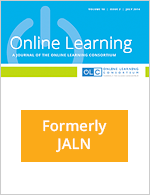Volume 15, Issue 1 - February 2011
Blended Environments: Learning Effectiveness and Student Satisfaction at a Small College in Transition
As higher education moves increasingly to blended and fully online environments, smaller institutions often ask whether this is a desirable trend. They face many challenges in transforming their largely face- to-face didactic teaching traditions to the technology mediated learning environments. Learning effectiveness and student satisfaction are seen to be decisive...
Transitioning to Blended Learning: Understanding Student and Faculty Perceptions
This paper describes the conversion of an introductory computing course to the blended learning model at a small, public liberal arts college. Blended learning significantly reduces face-to-face instruction by incorporating rich, online learning experiences. To assess the impact of blended learning on students, survey data was collected at the midpoint...
Content vs. Learning: An Old Dichotomy in Science Courses
The principles of course redesign that were applied to a gateway Cell Biology course at the University of Wisconsin-Milwaukee are applicable to courses large and small, and to institutions of any size. The challenge was to design a content-rich science course that kept pace with present and future content and...
Adopting a Blended Learning Approach: Challenges Encountered and Lessons Learned in an Action Research Study
Adopting a new teaching approach is often a daunting task especially if one is an early adopter in a limited-resource environment. This article describes the challenges encountered and the strategies used in pilot testing a blended instructional method in a large size class within the college of education at a...
Blending at Small Colleges: Challenges and Solutions
Implementing blended accelerated learning programs or courses requires a systematic approach, not just the addition of new technologies. Small colleges face challenges when they move toward blended learning because of already-constrained resources. In this article, we will survey issues faced by small colleges in moving to blended learning, document a...
Designed Learner Interactions in Blended Course Delivery
In transitioning to a hybrid delivery model, faculty are presented with an opportunity to engage in a systematic instructional design process which can bring coursework in line with pedagogical best practices that may not exist in traditional face-to-face classes. This paper presents a model whereby Marist College Academic Technology &...
Faculty Development: A Stage Model Matched to Blended Learning Maturation
Faculty development programs are critical to the implementation and support of curriculum innovation. In this case study, the authors present lessons learned from ten years of experience in faculty development programs created to support innovation in technology enhanced learning. Stages of curriculum innovation are matched to stages of faculty development,...
Blending in the Bronx: The Dimensions of Hybrid Course Development at Bronx Community College
To support the growth of its blended courses, Bronx Community College (BCC), a unit of the City University of New York (CUNY), participated in a CUNY-sponsored initiative to increase blended learning options for students. The initiative allowed BCC to expand its existing faculty development program. This paper describes major aspects...
Cloud-Based Technologies: Faculty Development, Support, and Implementation
The number of instructional offerings in higher education that are online, blended, or web-enhanced, including courses and programs, continues to grow exponentially. Alongside the growth of e-learning, higher education has witnessed the explosion of cloud-based or Web 2.0 technologies, a term that refers to the vast array of socially oriented,...

